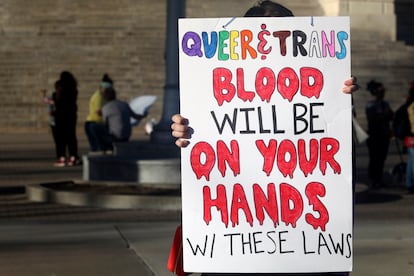The number of Kansas residents changing their gender jumped 300% before a new law began
The surge reported this week came ahead of a new state law that defines male and female on birth certificates and driver’s licenses based on a person’s sex assigned at birth

The number of people officially changing their gender in Kansas jumped more than 300% this year, ahead of a new state law that legally erases their ability to identify with a gender other than the sex assigned to them at birth.
The legislation is part of a raft of measures lawmakers across the U.S. have passed to roll back transgender rights. It has provisions meant to restrict transgender people’s use of restrooms, locker rooms and other facilities and applies to a person’s identity listed on state documents such as birth certificates and driver’s licenses.
The Kansas law takes effect Saturday, but it’s not yet clear how it will play out in the daily lives of transgender people. The new legislation conflicts with a 2019 federal court order directing the state to allow transgender people to change their birth certificates.
Democratic Gov. Laura Kelly, who vetoed the law but was overridden by the Republican-controlled Legislature, hasn’t said whether she will have state agencies continue to allow changes. She has said that she disagrees with the legal opinion of conservative state Republican Attorney General Kris Kobach, who has stated that the law supersedes the judge’s order. Kobach also has asked a judge to formally rescind the order.
The attorney general even indicated that the flurry of last-minute changes by transgender people has been for naught: He says the law requires the state to undo any changes that have been made to official documents.
At a Statehouse news conference this week, Kobach said the governor “has a legal and indeed a constitutional obligation to comply with the law.”
Asked whether he would sue Kelly if she doesn’t, he replied, “If that were necessary, then absolutely.”
With the legal climate uncertain, the nonprofit legal aid group Kansas Legal Services and LGBTQ+ rights advocates have run seminars for transgender people on how to change their documents. Both birth certificates and driver’s licenses list “sex,” which the new state law defines as a person’s “biological reproductive system” at birth.
“There was a big push... to try and help people get their gender marker changed before July 1,” said Taryn Jones, vice chair and lobbyist for the LGBTQ+ rights group Equality Kansas.
An average of 58 Kansas residents a month have changed their birth certificates so far this year, or 334% more than the average of 13 a month from July 2019 through 2022, according to state health department figures released this week. Since July 2019, more than 900 people have changed their birth certificates, but almost 350 of those, or 38%, did it this year as the Republican-controlled Legislature debated and then passed the new law.
The state motor vehicle department reported this week that 161 people have changed their gender identity on their driver’s licenses so far this year, an average of 27 a month. That’s an increase of 384% over the average of five and a half per month from July 2019 through 2022. Almost 400 people have changed their driver’s licenses since July 2019.
According to the state’s data, 126, or 78% of the changes in gender on driver’s licenses came in May and June, after lawmakers overrode Kelly’s veto.
Some birth certificates have been changed by health care providers who incorrectly recorded the sex assigned a baby at birth. Others were for babies born with intersex conditions, such as ambiguous genitals, who were not initially assigned a sex at birth but had their parents later choose one for them.
Jenna Bellemere, a transgender University of Kansas student, said she changed her birth certificate and driver’s license last year, believing “this anti-trans stuff” was building.
“I didn’t really want to go throughout my life carrying around a document that really was inaccurate and an ID with a name that no one calls me anymore,” she said.
Sign up for our weekly newsletter to get more English-language news coverage from EL PAÍS USA Edition
Tu suscripción se está usando en otro dispositivo
¿Quieres añadir otro usuario a tu suscripción?
Si continúas leyendo en este dispositivo, no se podrá leer en el otro.
FlechaTu suscripción se está usando en otro dispositivo y solo puedes acceder a EL PAÍS desde un dispositivo a la vez.
Si quieres compartir tu cuenta, cambia tu suscripción a la modalidad Premium, así podrás añadir otro usuario. Cada uno accederá con su propia cuenta de email, lo que os permitirá personalizar vuestra experiencia en EL PAÍS.
¿Tienes una suscripción de empresa? Accede aquí para contratar más cuentas.
En el caso de no saber quién está usando tu cuenta, te recomendamos cambiar tu contraseña aquí.
Si decides continuar compartiendo tu cuenta, este mensaje se mostrará en tu dispositivo y en el de la otra persona que está usando tu cuenta de forma indefinida, afectando a tu experiencia de lectura. Puedes consultar aquí los términos y condiciones de la suscripción digital.








































